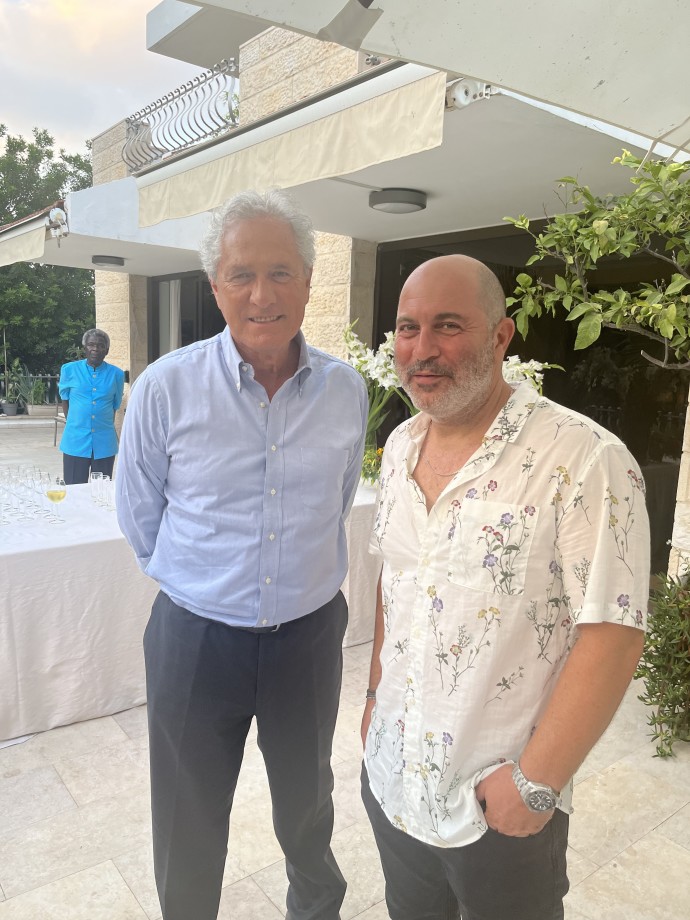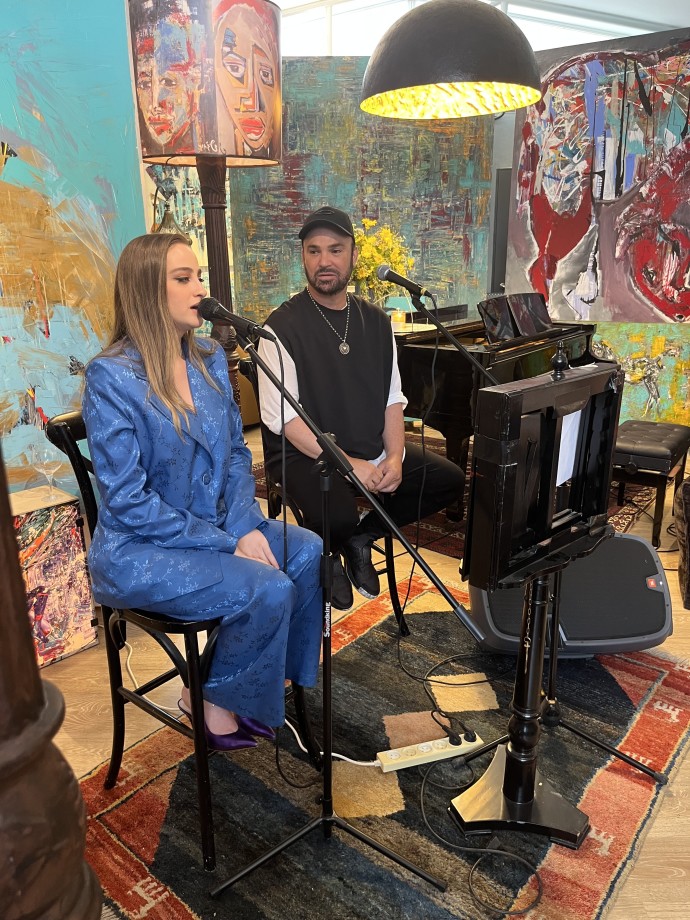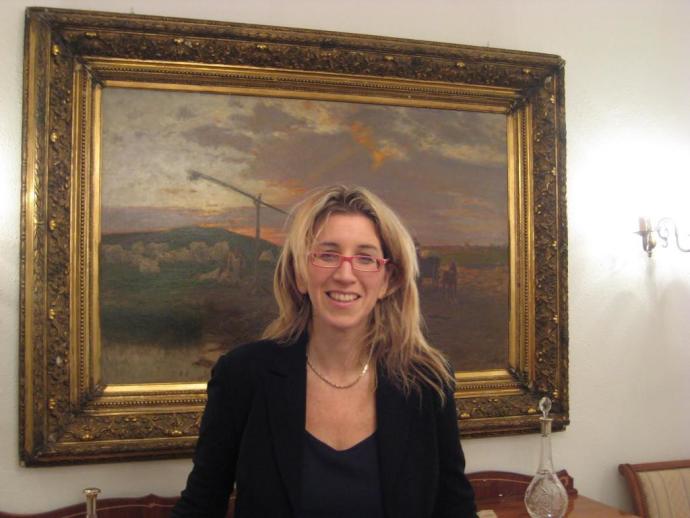‘Israel is a creative cultural power,” says Nurit Tinari, head of the Cultural Relations Division at the Foreign Ministry, which is responsible for carrying out the State of Israel’s cultural policies and activities and encouraging the exposure and export of Israeli culture to the world. Tinari explains that the concept of using culture as a diplomatic tool was broadened by Shimon Peres, who understood the potential of utilizing Israel’s cultural appeal to achieve diplomatic goals. Recognizing Israel’s soft power in this area, Peres placed cultural diplomacy at the forefront of Israel’s diplomatic activity.
“Every day – in every country in the world – there is an Israeli cultural event. This is an unprecedented figure.”
“Culture affects the heart, emotions, mind and the soul,” says Tinari. “When you listen to a musical composition played by an Israeli musician or read an interesting book by an Israeli author, you can gain a greater understanding of the complex reality of Israel, which can be more beneficial than a dry political argument.” Israeli diplomats in 108 diplomatic missions around the world, she says, promote the export of Israeli culture for the benefit of Israeli performers and cultural organizations.
In an effort to raise the country’s cultural profile, Prime Minister Yair Lapid, during his tenure as minister of foreign affairs, and Alon Ushpiz, director-general of the Foreign Ministry, set a goal for the ministry to ensure greater exposure to Israeli culture around the world. From that decision, “365 Days of Israeli Culture Around the World,” a Jerusalem Post web portal, was born. The site reports on how Israeli culture is being exported and presented worldwide via the country’s diplomatic missions and embassies in a wide variety of disciplines, including film, television, music, theater, dance, visual arts, literature and the culinary arts.

“Israeli diplomats around the globe are invested in promoting cultural exports for the benefit of Israeli artists and cultural bodies,” says Tinari, who has been a career diplomat with the ministry for the past 30 years. “We want to inform the general public, both in Israel and abroad, about the tremendous and diverse scope of Israeli cultural activity around the world carried out by Israeli diplomacy.”
Some of the recent events featured on the 365 Days of Israeli Culture site include Fauda star Tsahi Halevi delighting audiences in Mumbai and New Delhi with Hindi song, poet Ronny Someck appearing in a festival in Cyprus, Hollywood icon Henry Winkler starring in a racy Israeli TV series, a colorful mural in the center of Athens painted by an Israeli artist, Shakshuka diplomacy in China and a wine-tasting event held at the home of the Israeli ambassador in Brasilia.
The site includes video and audio clips, photos and news items describing Israeli cultural events and will feature continuous updates on Israeli cultural events held throughout 2022.
Tinari says that the portal’s “365 days of culture” slogan is accurate. “Every day – in every country in the world – there is an Israeli cultural event. This is an unprecedented figure.” She adds that often, several events are held simultaneously on the same day and in the same country.
Using culture as a diplomatic tool is not propaganda, says Tinari. Rather, it presents a legitimate way for Israel to be viewed “as any other country” by others through its cultural and artistic achievements. “The arts build bridges among people,” says Tinari. “They facilitate intercultural understanding and provide a common language which is an asset for building relationships in an increasingly diverse and global society.”
Tinari reports that exporting Israeli culture helps break stereotypes and illustrates the complexity of life in Israel. Subjects such as the Holocaust, the Palestinian-Israeli conflict, religion and state, tradition versus innovation, democracy, ethnicity, new immigrants, Israel and the Diaspora, security issues, the status of women, LGBT, the climate crisis, corruption and bureaucracy expose consumers of Israeli culture to the country’s complicated reality.
“We use cultural tools not for ‘beautifying’ Israel, but rather as a rational and professional choice,” says Tinari.

Outsiders frequently view Israel through the narrow prism of the Palestinian issue and expanding the discussion creates a more balanced picture of Israeli life.
Tinari refers to a 2016 European Union study that advised the EU to take advantage of its cultural and creative assets to strengthen its influence around the world. The study concluded that cultural assets are just as important as political or economic ones. “If these are the EU’s conclusions, then it applies all the more so to Israel,” she says.
Tinari notes that some of the biggest names in Israeli culture, including actor Gal Gadot, writers David Grossman and Etgar Keret, chefs Israel Aharoni, Shaul Ben Aderet and Haim Cohen, musicians Achinoam Nini, Idan Reichel, David D’or and many others got their start via the Cultural Relations Division (known by the Hebrew acronym ‘KASHTUM’) at the Foreign Ministry.

Israeli diplomatic missions abroad participate in local festivals and cross-border exhibitions such as the Venice Art Biennale, the London Design Biennale, the World Music Expo, the Edinburgh Festival, the Frankfurt Book Fair, the Cannes Film Festival and more. The ministry assists in translating Hebrew literature, plays, films and TV series, hosts foreign guests in international cultural events held in Israel and supports the activities of the diplomatic missions abroad.
Beyond the 365 Days of Israeli Culture website, Tinari says the Foreign Ministry has big plans for promoting and utilizing Israeli culture. The Foreign Ministry will continue to host international showcases held in Israel in cooperation with the Culture Ministry, in which cultural buyers from around the world view the best Israeli artistic activity in the fields of dance, theater, music and visual art, and choose the performances that they would like to present in their countries.
Tinari adds that the cabinet recently approved the pooling of budgetary resources and agreed to continue the dialogue with the EU on joining the Creative Europe program, which will allow Israeli cultural institutions and artists to submit proposals for joint projects with colleagues from European countries and neighboring countries that are members of the program to receive funding from the European Commission.
“Israeli diplomats around the globe are invested in promoting cultural exports for the benefit of Israeli artists and cultural bodies,”
Nurit Ninari, Ministry of Foreign Affairs
The Foreign Ministry, says Tinari, is working on co-production agreements in joint television and film work. “We are working hard to encourage the creation of a film with ‘Bollywood,’ the Indian film industry, which is the world’s largest, and Nigeria’s film industry, known as ‘Nollywood.’”
Israel is an up-and-coming content provider in the TV and film industry, she says. Traditionally, Tinari notes, the majority of film content has been produced and developed by Hollywood, but the situation is changing. This year, for the first time in history, the three most-watched series on Netflix are the Korean Squid Game, the Spanish Money Heist and the French Lupin.
The changing economic situation and cultural changes in which people watched more television during COVID, says Tinari, has created a golden opportunity for non-English-speaking countries to become leading content producers, and the ministry has noticed.
“Our cultural attachés in Los Angeles and New York have created connections in the television market,” notes Tinari, “and have developed relationships with key players in the content field at Netflix (which has also pledged to give a $20,000 prize to a promising Israeli creator), Amazon, Apple TV+, Disney+, HBO, 20th Century Fox MGM, WME, CAA and others.” The aforementioned will be participating in a flagship event of the Cultural Diplomacy Division that will be chaired by deputy minister Idan Roll of the Foreign Ministry, and in collaboration with the Sam Spiegel School’s series incubator this September to promote Israeli industry in Los Angeles, that will encourage creative partnerships and agreements, and position Israel as a television content powerhouse.
“This is an opportunity for the Foreign Ministry to present its diverse, complex, and interesting Israel to hundreds of millions of screens in homes around the world. Thanks to the Abraham Accords, an effort has been made to expand cultural ties and carry out more cultural activities in Morocco, the United Arab Emirates, Bahrain and Egypt, as much as possible,” adds Tinari.
Next year, Israel will be celebrating its 75th anniversary. “Let’s hope,” says Tinari, “that the budget we receive will be significant, and together with it, the number of cultural events organized by Israel’s diplomatic missions will increase.”
This article was written in cooperation with the Foreign Ministry.
